AMD Ryzen Threadripper 1900X CPU Review
Why you can trust Tom's Hardware
Office & Productivity
Test Notes
We toggled Ryzen Threadripper 1900X into Creator Mode for our application testing. This setting exposes the full might of AMD's 8C/16T design, even if some lightly threaded applications fare better under various combinations of the NUMA/UMA and Legacy mode toggles.
Adobe Creative Cloud
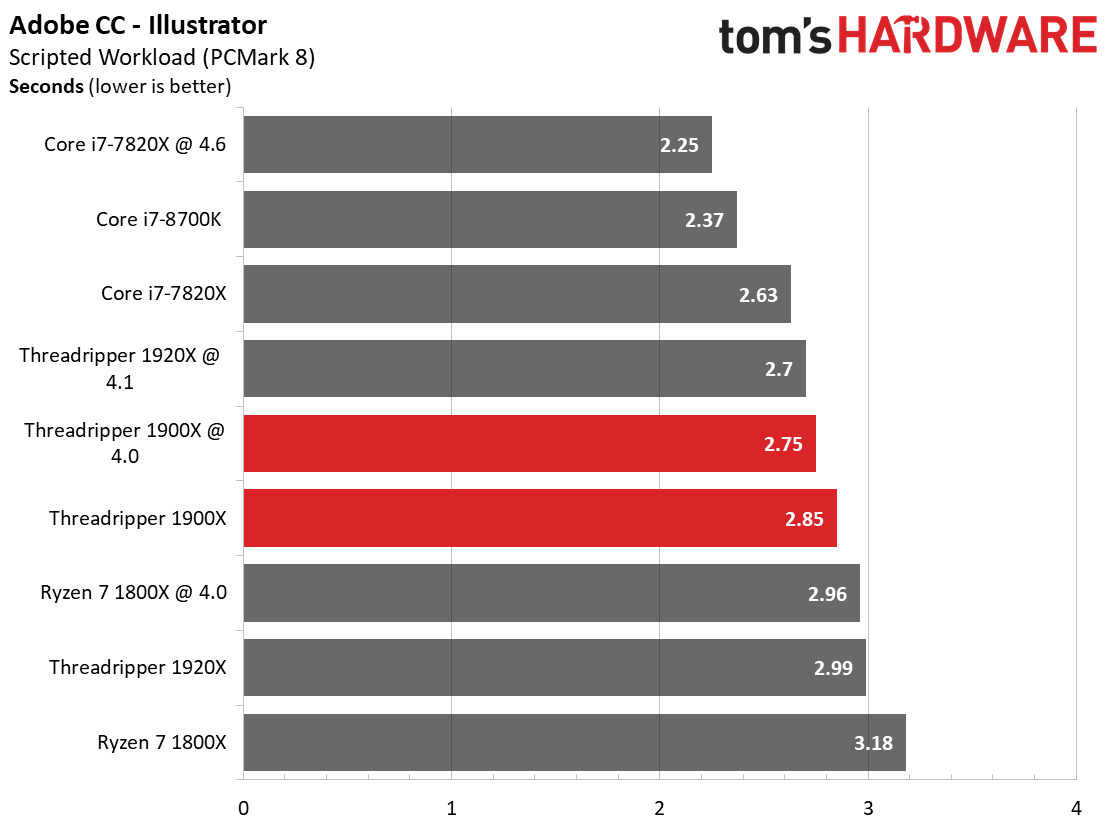
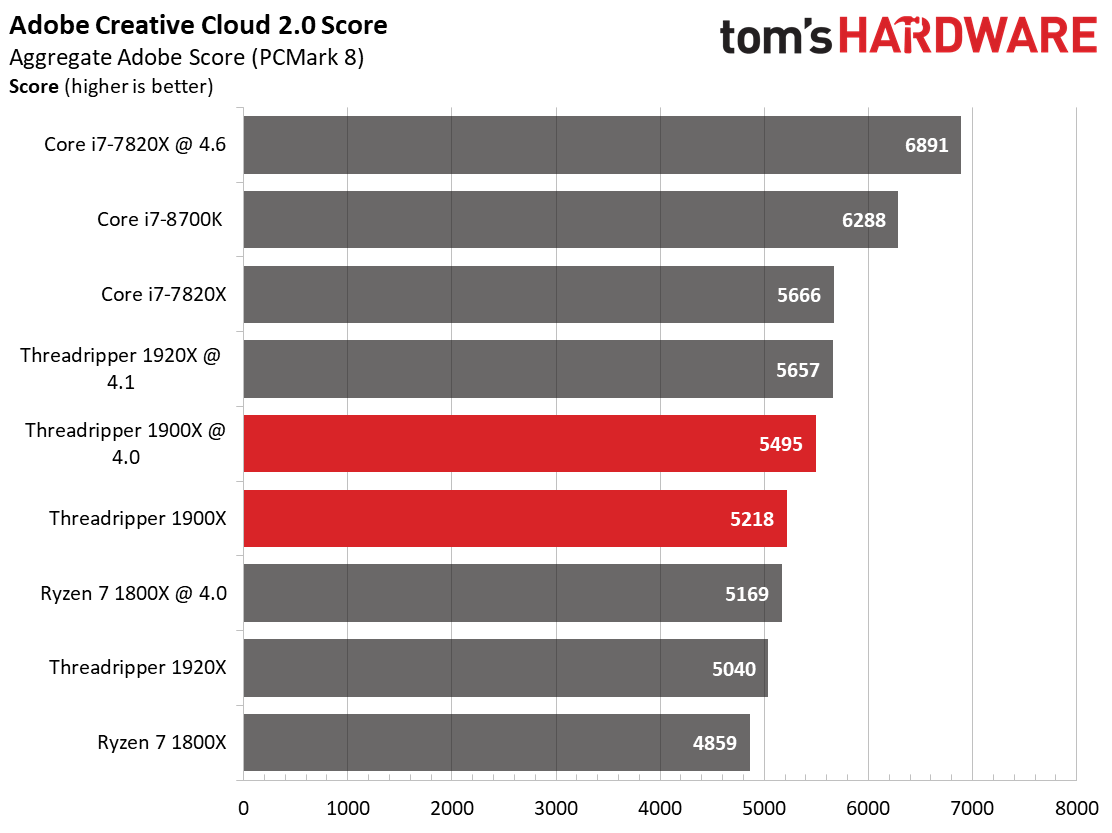
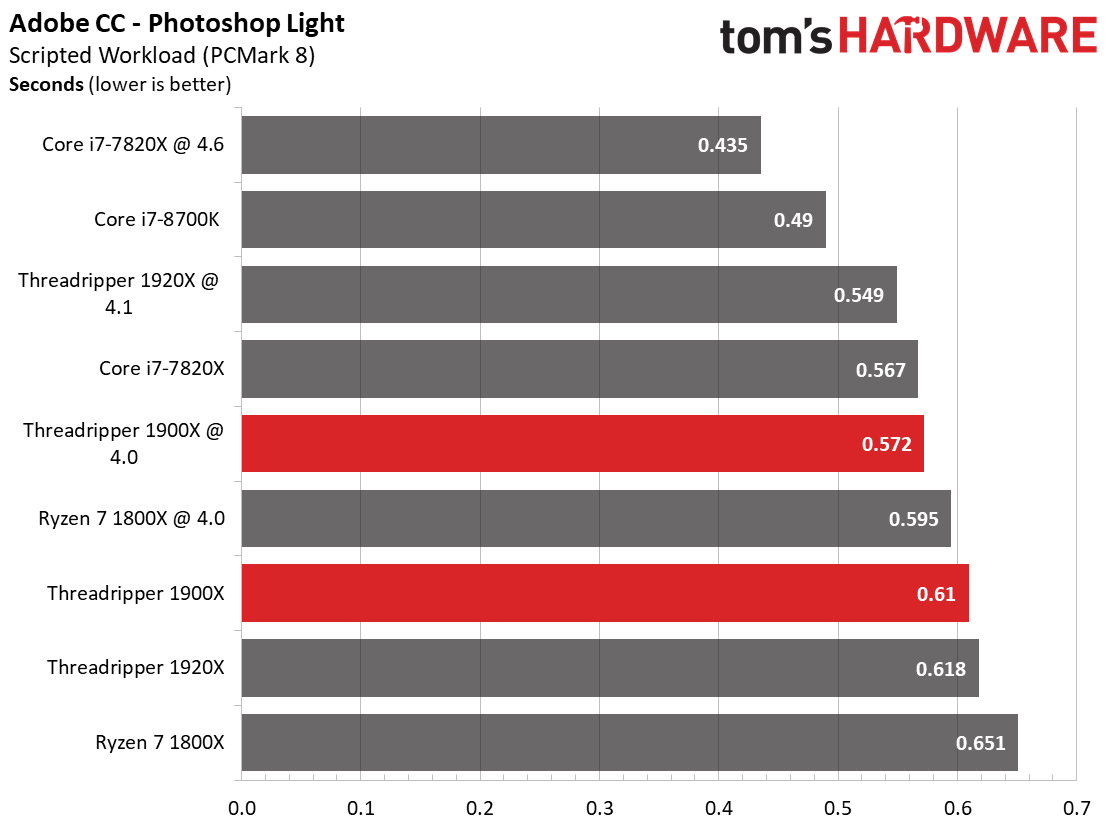
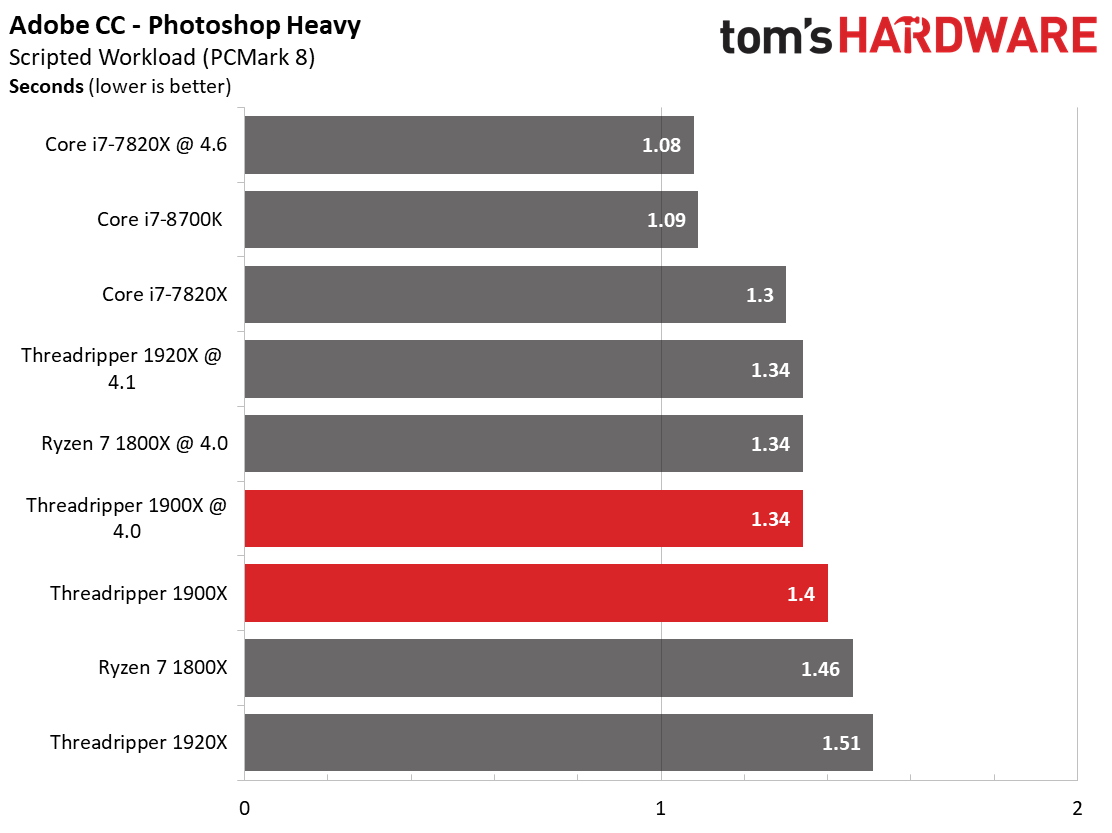
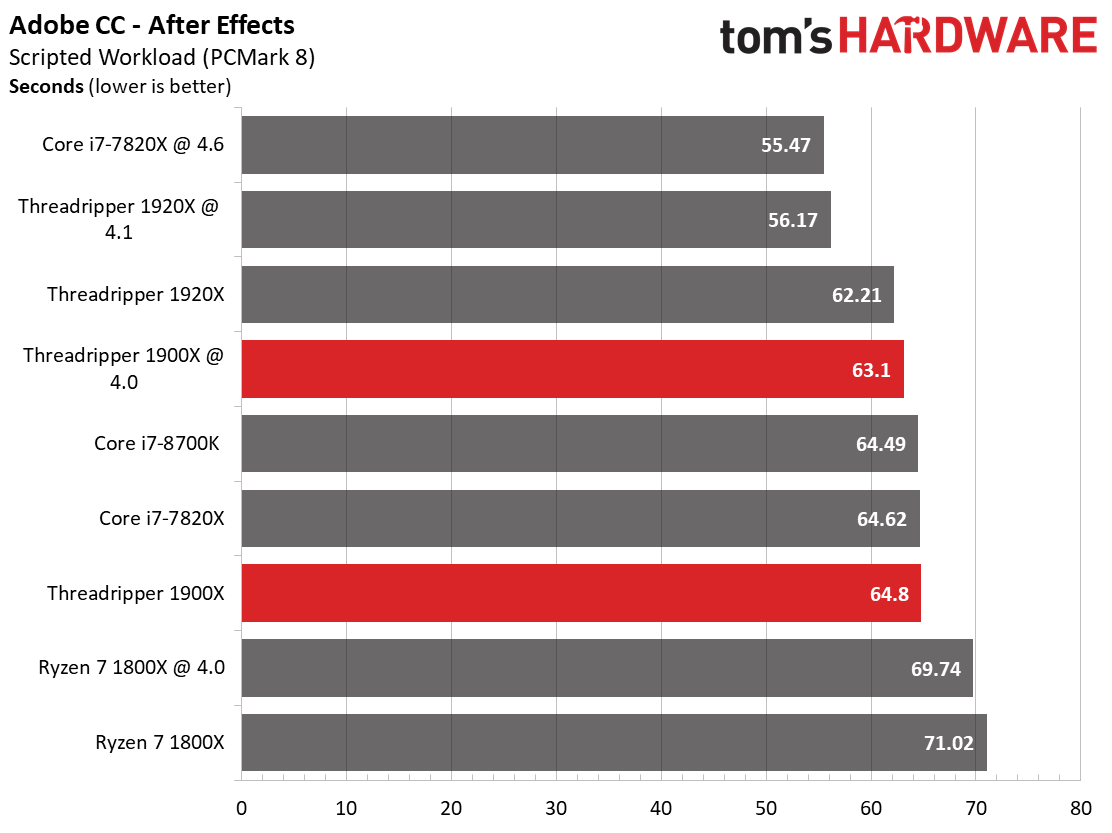
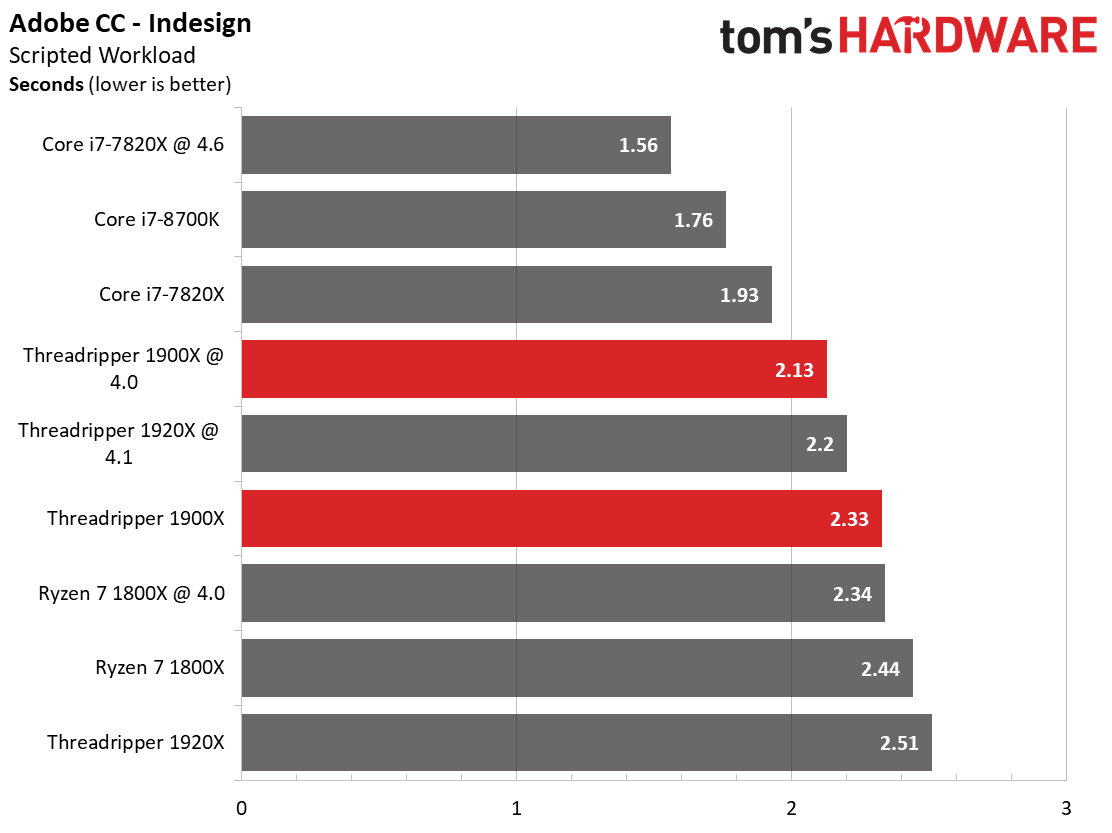
Most of the Adobe Creative Cloud test suite favors Intel's processors.
Ryzen Threadripper 1900X serves up competitive performance and benefits from tuning, but the 1920X's overclocked frequency advantage facilitates a slight win in most tests.
After Affects responds well to increased core counts, so the 1900X competes readily. Ryzen 7 1800X isn't as fast in this test, languishing far below the eight-core 1900X. It seems as if the difference comes from Threadripper's quad-channel memory configuration, as repeating the test in dual-channel mode incurs a ~6-second penalty, putting 1900X at the same level as Ryzen 7 1800X. We also observed similar trends with the Photoshop Heavy and InDesign tests.
Web Browser
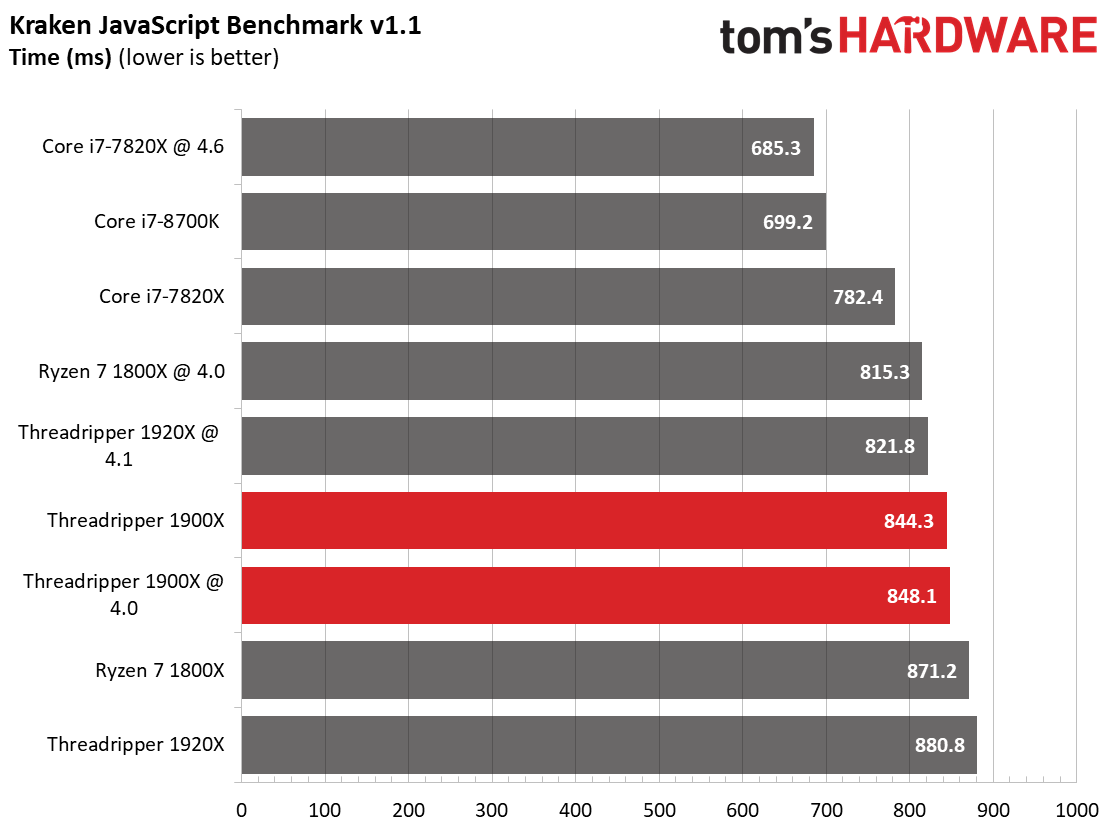
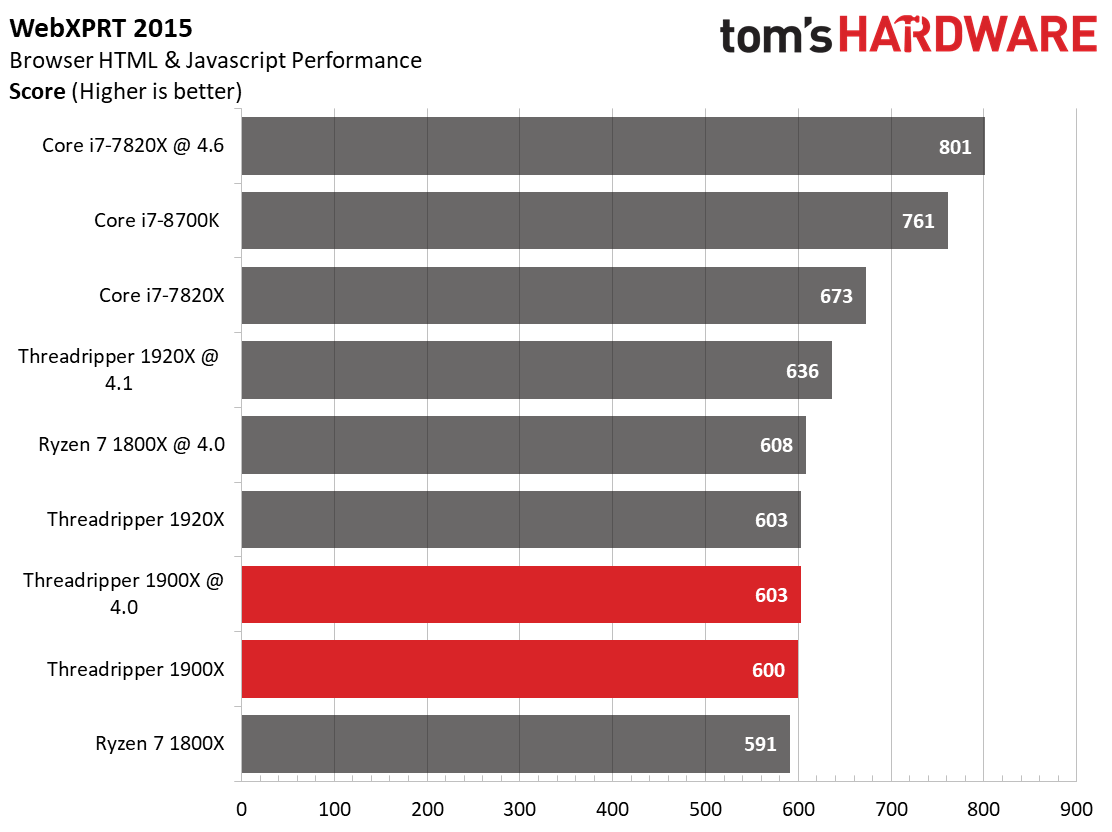
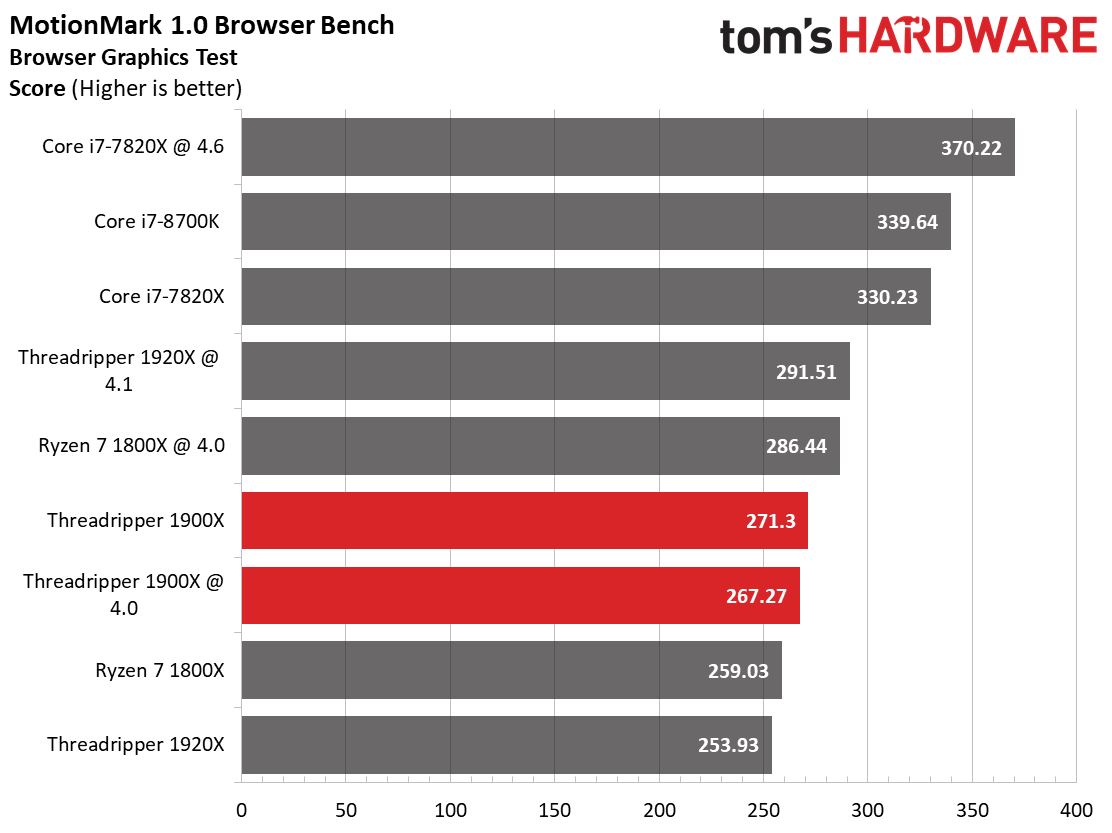
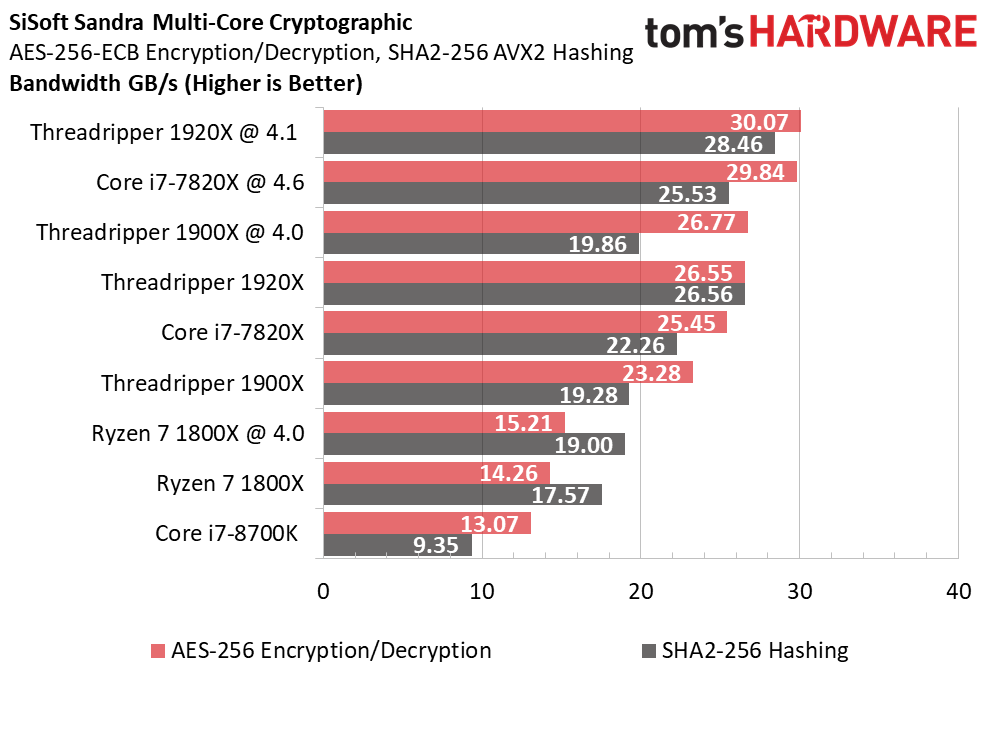
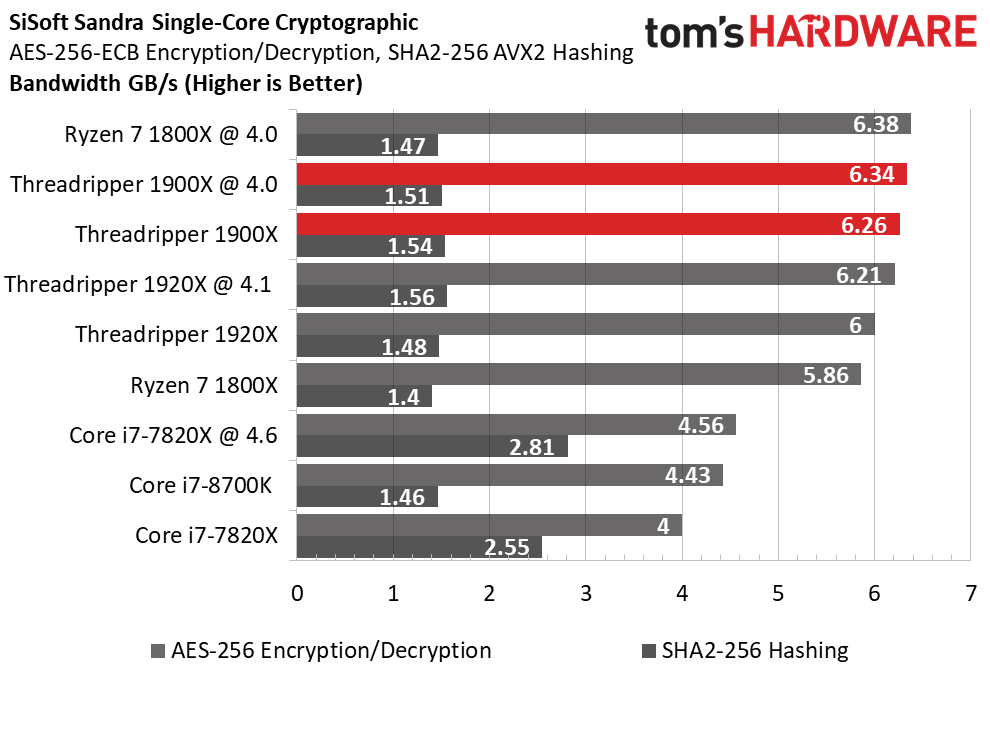
The web browsing tests align largely based on per-core performance, so frequency and IPC throughput reign supreme. These lightly-threaded metrics highlight the only drawback to overclocking the 1900X.
That is to say our 1900X's 4 GHz ceiling is the same as its maximum quad-core Precision Boost frequency, so overclocking will speed up workloads that use more than four cores. However, if your cooler is beefy enough, a stock Threadripper 1900X hits a 4.2 GHz Extended Frequency Range peak across four cores. So, in some lightly-threaded tasks, you'll see a stock 1900X outperform the overclocked configuration.
Case in point: a stock 1900X outperforms the tuned configuration in our Kraken JavaScript and MotionMark benchmarks, though the deltas are small. A tuned Ryzen 7 1800X also offers better performance than the 1900X. The Intel processors use their frequency and IPC throughput advantage to top the charts.
Get Tom's Hardware's best news and in-depth reviews, straight to your inbox.
Cryptography is important for securing online transactions and many other applications. The Threadripper processors enjoy a big lead over competing Intel models in single-core SHA2-256 hashing performance. They are also competitive in the single-core AES-256 tests. But we can clearly see the benefits of the -7820X's AVX2 performance compared to the Core i7-8700K.
Multi-core AES-256 tests align based largely on core count and frequency, but we can spot the advantages of quad-channel memory. The overclocked 1900X doesn't gain much improvement in the SHA2-256 test.
Productivity
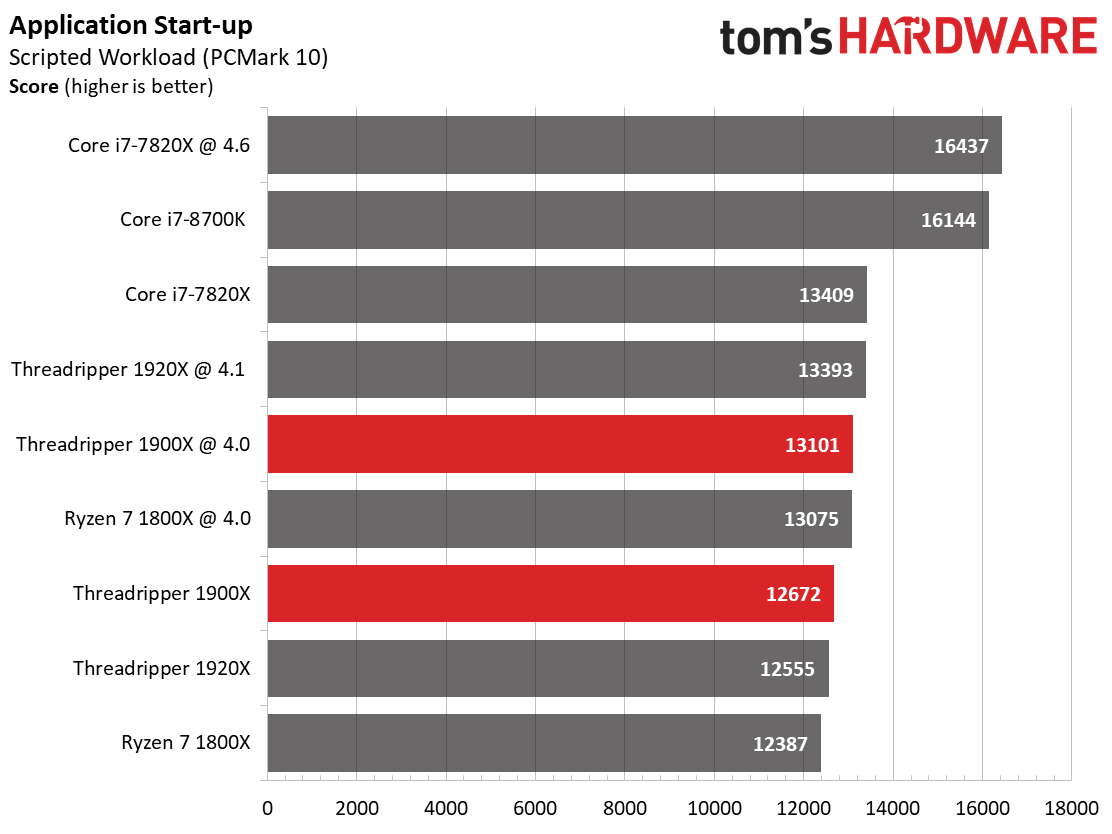
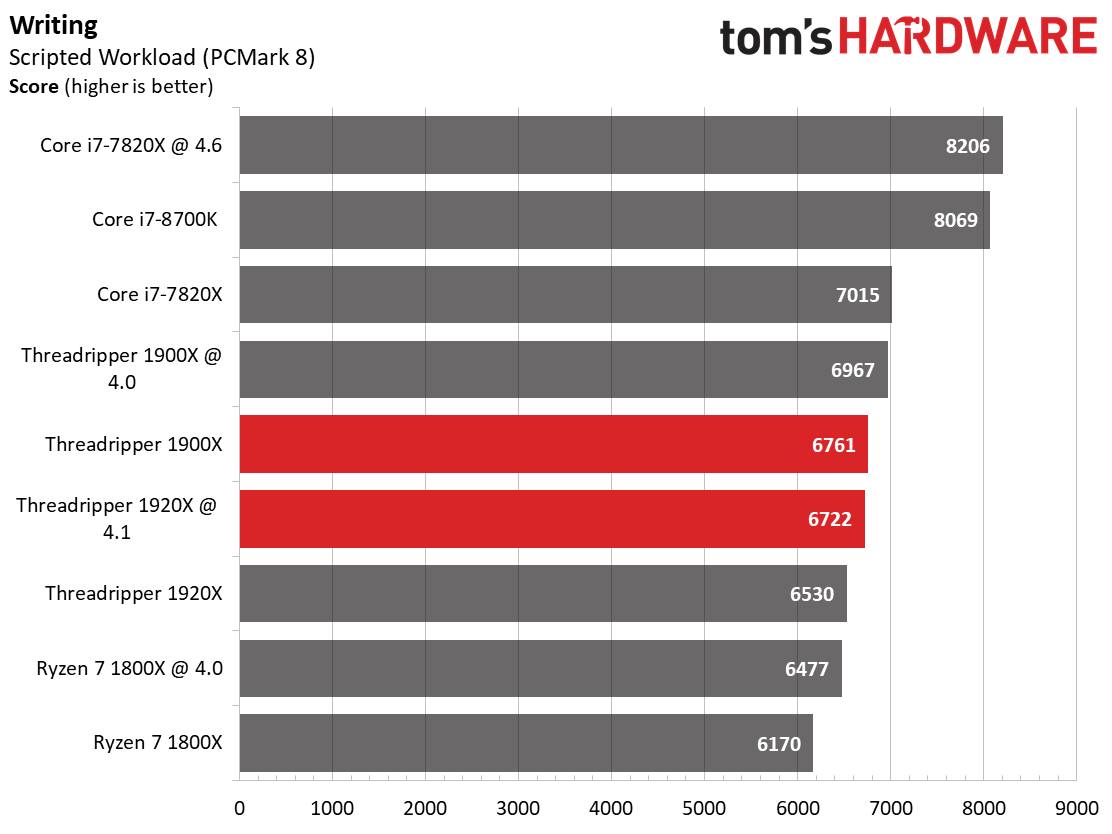
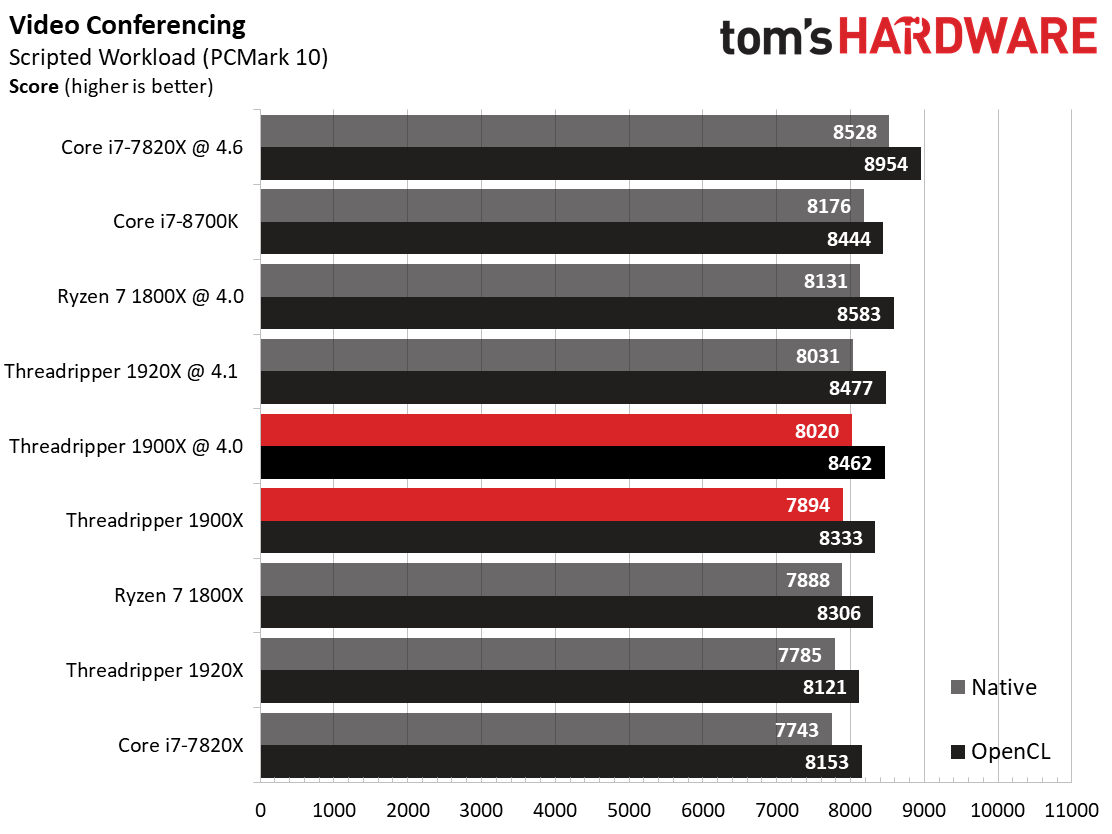
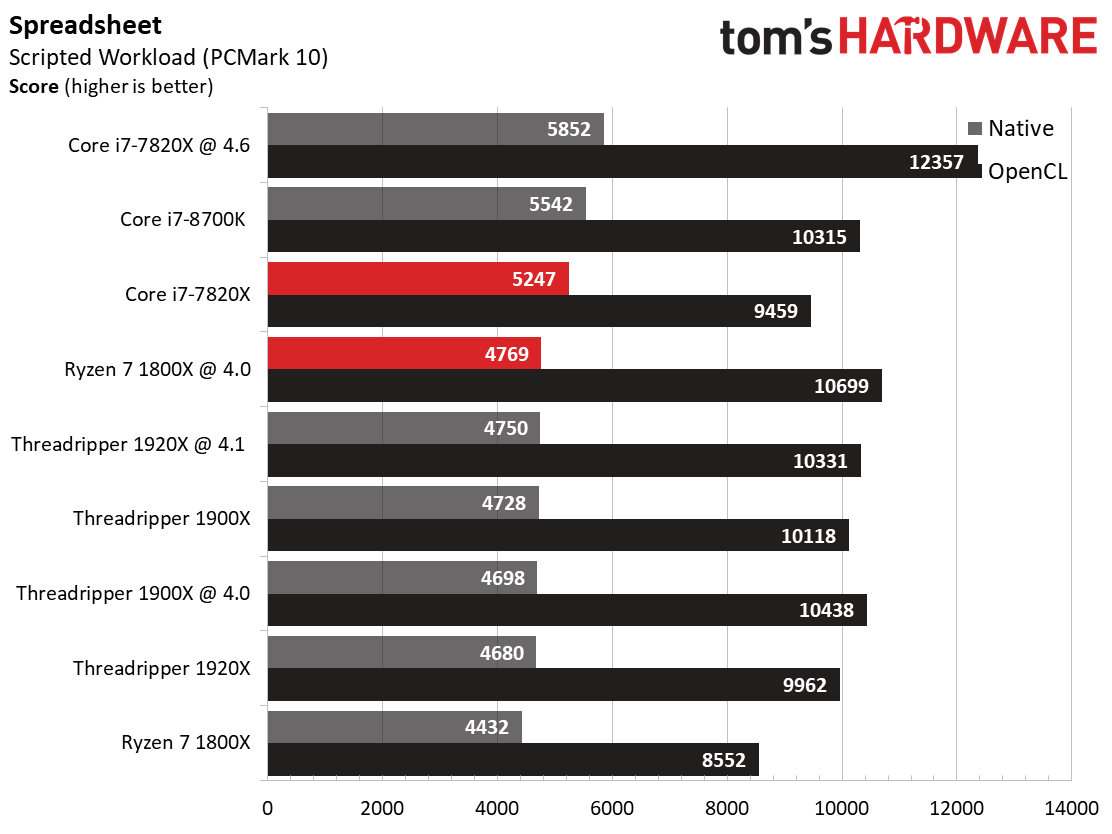
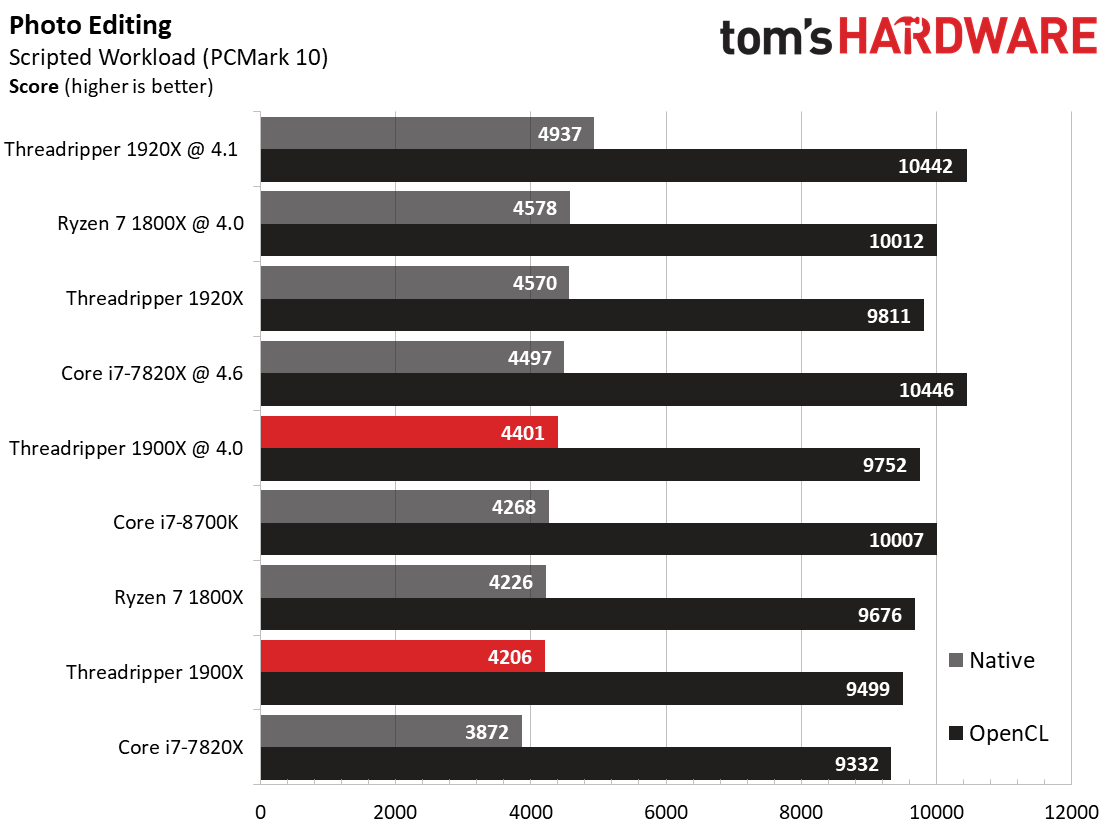
We're incorporating portions of the PCMark 10 suite into our test regimen. The application start-up metric measures load-time snappiness for several types of applications, such as word processors, GIMP, and Web browsers, in both warm- and cold-start conditions.
Intel's Core i7-7820X beats the overclocked Threadripper models by a slight margin, but tuning widens the gap considerably. Interestingly, a stock Core i7-8700K almost matches the best effort of our overclocked -7820K. Coffee Lake truly is an impressive performer here.
Video conferencing measures performance in single- and multi-user applications that utilize the Windows Media Foundation for video playback and encoding. It also performs facial detection during the workload to model real-world performance. The test consists of both native and OpenCL acceleration, so we see small performance improvements with OpenCL. The Threadripper 1900X and 1920X fall into the middle of the test results, while the tuned Ryzen 7 1800X provides more performance with native processing.
The photo editing benchmark measures performance with Futuremark's binaries that use the ImageMagick library. We can see the big gains with OpenCL acceleration, and the processors with the highest clock rates generally offer the best results. That means Intel's tuned -7820X and AMD's overclocked 1920X provide similar performance. The 1900X benefits from tuning, but Ryzen 7 1800X at 4 GHz is even faster. Native processing leverages Theadripper 1920X's extra threads to great effect.
We tested the 1900X with both dual- and quad-channel memory to ferret out improvements borne of extra bandwidth. The 1900X with quad-channel memory provided ~6% more performance than the dual-channel setup during the writing test (LibreOffice Writer), helping propel the overclocked 1900X to a lead over the tuned 1800X.
MORE: Best CPUs
MORE: Intel & AMD Processor Hierarchy
MORE: All CPUs Content
Current page: Office & Productivity
Prev Page Project CARS, Far Cry Primal & Rise of the Tomb Raider Next Page Rendering, Encoding, Compression & AVX
Paul Alcorn is the Editor-in-Chief for Tom's Hardware US. He also writes news and reviews on CPUs, storage, and enterprise hardware.
-
rcrossw My 1900x is on an Asus Prime X399-A and running stable at 4190 Ghz. Temp 44 C. Prior to the 403 Bios it ran at 4225 Ghz.Reply
This is to let others know what I was able to do with the 1900x. I use a Ryzen 1700 for gaming. I do Photo work and Ballistics, on the 1900x. For what I use it for it is superb product. One last thing - I run both systems at 4K Res. Better on my older eyes. -
TechyInAZ Excellent review. I've been waiting for this review for a while since it's the strangest threadripper CPU in the family. Specifically i was wondering if they were going to do two cores per CCX, glad they decided to do just all 4 in one CCX for better latency.Reply -
Kawi6rr Is Threadripper a gaming CPU? If not then why do you test in so many games? Doesn't make sense.Reply -
Paul Alcorn Reply20301236 said:Is Threadripper a gaming CPU? If not then why do you test in so many games? Doesn't make sense.
31 tests for applications. Some tested with both native CPU processing and OpenCL acceleration. Also, four synthetics that measure key performance traits.
10 games, four synthetics.
-
antonysg77 For a normal user who also plays games, Ryzen 7 1700 is a powerful processor, which is power efficient and also comes with its own cooling solution. Also, both the processor and motherboard are very reasonably priced.Reply -
mapesdhs Reply20301281 said:31 tests for applications. Some tested with both native CPU processing and OpenCL acceleration. Also, four synthetics that measure key performance traits that are applicable to some apps.
Bit odd basing the conclusion on tests that are not by the initial introduction representative of the target market for the product. Why does everything have to be about gaming?? If the CPU isn't aimed at gamers in the conventional sense then surely it makes more sense to test it based on the kind of task it is aimed at? For example, setup an X399/1900X system with four GPUs for CUDA in AE or somesuch, compare it to the same GPU config on an X299 board, how do they behave? Efficiency, power consumption, render times, stability during an intense render, etc.
At the very least do some tests at 4K while streaming and show how the systems compare under such a scenario, such as GN has done for various CPU comparisons.
Ian.
-
cryoburner Reply20301236 said:Is Threadripper a gaming CPU? If not then why do you test in so many games? Doesn't make sense.
It makes sense in that they can show that to people who might be considering going with it for a gaming system. Some people tend to think that just because some piece of hardware is more expensive that it will be better for gaming, when in reality that hardware may cost more because it adds features that don't even provide much benefit to games. The 1900X enables quad channel memory with a higher maximum memory limit, but games won't benefit from that, and 16GB of dual channel memory should work just as well for years to come. Likewise, a gaming system won't likely see much benefit from having a CPU with 64 PCIe lanes. Someone wanting an 8 core processor for a gaming system would likely get comparable performance by overclocking a Ryzen 1700 on an X370 motherboard for several hundred dollars less. The same goes for other HEDT processors with lots of cores like the other Threadripper parts and Intel's equivalents. For gaming, those extra cores won't likely provide any benefit, and will likely only make it harder to keep the chip cool,resulting in lower clock rates if anything. Of course, there will also be some people who want those extra hardware features for specific tasks other than gaming, but may want to be able to game on the system as well. -
anbello262 Reply20301236 said:Is Threadripper a gaming CPU? If not then why do you test in so many games? Doesn't make sense.
This site is aimed mainly at gamers, so it makes sense to base the conclusion on gaming performance. You just seem to be upset that "someone might read this the wrong way and think AMD sucks", as if our job would be caring for the companies best interests.
They can do their own marketing, the job of Tom's is to give us all the information in the most scientifically accurate way possible, and then sum it up with a conclusion aimed at their readers, who are mostly gamers.
If you are not a gamer, then you can just read the pages with the productivity apps, and just ignore the conclusion (since it will not apply to you). There is no misrepresentation or false information anywhere in the article -
Paul Alcorn Well, the conclusion also takes application performance into account.Reply
"The real competition happens in our application workloads."
Also, there are seven application price efficiency charts in the conclusion. -
Nintendork BILLY GATESReply
Dunno if you forgot than with any TR chip you will get the full 64pcie lanes + ECC support. Where can you find that even on the 2K i9? Well, you won't.